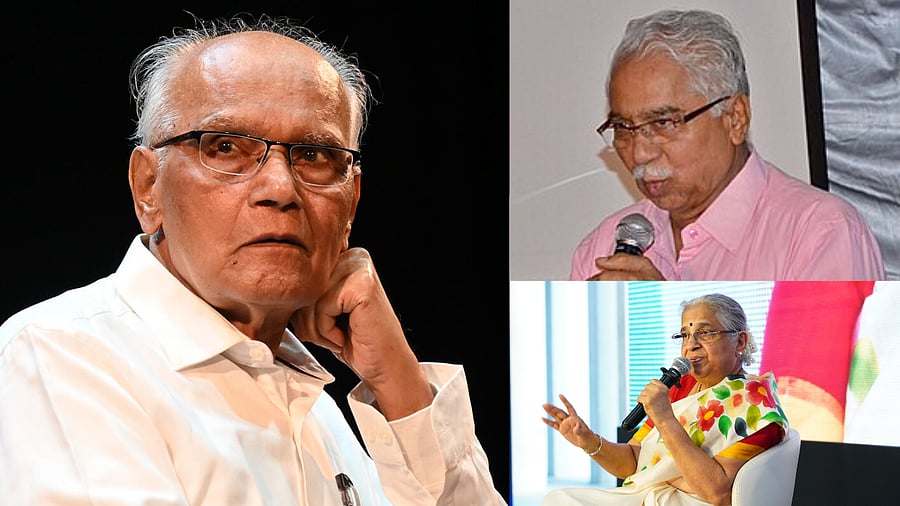
S L Bhyrappa (L), Chandrashekhara Kambara (top) and Sudha Murty (below)
Credit: Wikipedia/X@Sudha Murty/DH Photo
Bengaluru: The Kannada literary world is in mourning following the passing away of S L Bhyrappa.
The news of his demise prompted an outpouring of grief and tribute from across the artistic and literary fraternity.
Jnanpitha awardee Chandrashekhara Kambara recollected that he and Bhyrappa were very close friends and used to travel together a lot. Their conversations were filled with endless humour, he said.
Kambara expressed his admiration for Bhyrappa’s writing, noting that he had a “map” for his work and was a very good man. After returning from the US as a Fulbright scholar in 1968-69, Kambara was helped by Bhyrappa to get a job. He supported him, and they had mutual respect and love for each other. Bhyrappa was like a guru to him, he added.
P Sheshadri, a renowned Kannada filmmaker, reflected on Bhyrappa’s unique craft, describing him as a writer whose works possess a powerful visual quality.
“Whenever we read his works, we get an image,” Sheshadri said. “For a filmmaker, the image is strong, and I see his novels visually.” He has authored 24 novels in over 60 years of his literary career. The 400 to 500 characters in his novels are different and unique, he added.
He had that capacity to enter into multiple characters and the thoughts that develop in these characters, he used to capture them in his writings.
Sheshadri recounted the author’s initial aversion to filmmakers, recalling an instance during the making of Vamshavruksha, when Bhyrappa insisted that only B V Karanth could direct the film, stating, “Even if he makes mistakes, those will be creative mistakes.”
For Sheshadri, Bhyrappa remains alive through his works, having secured a “chair (pitha) in the hearts of the readers,” a recognition the author himself valued more than the Jnanpith award.
Literary critic T P Ashoka noted Bhyrappa’s independence from literary movements such as the Navya, Dalita, and Bandaya.
Sudha Murty, spoke to reporters, expressing her deep sorrow. She named Tabbaliyu Neenade Magane, Saartha, Gruhabhanga, Bhitti (his autobiography), Dharmashree, Naayi Neralu, and Nirakarana among her favorites.
Fellow writer Vaidehi recalled reading his novels like Doora Saridaru, Daatu and his other popular novels during her college days.
Hampa Nagarajaiah emphasised Bhyrappa’s discipline and extensive research, which became a hallmark of his works.
Vivek Shanbhag, another prominent writer, focused on Bhyrappa’s superior craftsmanship. “There is absolutely no doubt that Bhyrappa was one of the best novelists in Kannada,” Shanbhag said.
